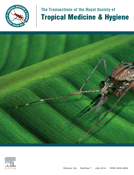-
Views
-
Cite
Cite
Eros A. Almeida, Josué N. Lima, Eliane Lages-Silva, Maria E. Guariento, Francisco H. Aoki, Ana E. Torres-Morales, Rogério J. Pedro, Chagas’ disease and HIV co-infection in patients without effective antiretroviral therapy: prevalence, clinical presentation and natural history, Transactions of The Royal Society of Tropical Medicine and Hygiene, Volume 104, Issue 7, July 2010, Pages 447–452, https://doi.org/10.1016/j.trstmh.2010.02.004
Close - Share Icon Share
Summary
The objectives of this study were to establish the prevalence of Chagas’ disease among HIV seropositive patients and to define the clinical profile of co-infected cases. Cross-sectional study: the prevalence of co-infected subjects was 1.3% and there was no significant difference between co-infected and non co-infected patients relative to race, birthplace, home address and CD4 T cells. The co-infected group comprised predominantly women and mean age and median viral load were higher. Longitudinal study: included 20 patients (12 women) and described the clinical presentation and natural history of concomitant infections. The mean follow-up time was 35.8 months, mean age was 43 ± 8.7 years and 60% of patients were white. During the follow-up, a total of 113 serological tests for Chagas’ disease were performed: 89 (78.8%) were reactive/positive, 21 (18.6%) were doubtful and three (2.6%) were non-reactive/negative. Positive results for xenodiagnosis were high (81%). At the baseline evaluation, thirteen patients had the indeterminate form of Chagas’ disease and seven cardiopathy. One patient developed from indeterminate to digestive form, three had a reactivation of Chagas’ disease in the central nervous system, all had parasitological confirmation and received specific treatment. There were 11 deaths. Thus, HIV-infected patients should be tested for Chagas’ disease when epidemiologically relevant.






Comments